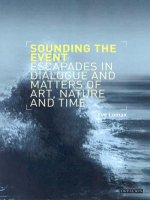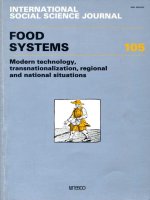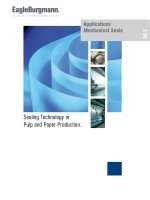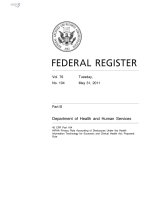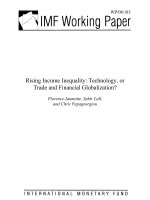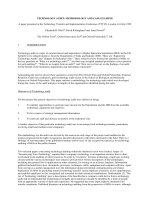Technology, art, civilizations and significants
Bạn đang xem bản rút gọn của tài liệu. Xem và tải ngay bản đầy đủ của tài liệu tại đây (297.84 KB, 4 trang )
International Journal of Mechanical Engineering and Technology (IJMET)
Volume 10, Issue 12, December 2019, pp. 260-263, Article ID: IJMET_10_12_029
Available online at />ISSN Print: 0976-6340 and ISSN Online: 0976-6359
© IAEME Publication
TECHNOLOGY, ART, CIVILIZATIONS AND
SIGNIFICANTS
Peñaranda Galvis, Vidal Fernando
Profesor Titular. Facultad del Medio Ambiente y Recursos Naturales.
Universidad Distrital Francisco José de Caldas.
Espinosa Romero, Ana Patricia
Directora Programa de Ingeniería Ambiental. Facultad de Ingeniería.
Universidad de La Guajira.
Rodríguez Miranda, Juan Pablo
Profesor Titular. Facultad del Medio Ambiente y Recursos Naturales.
Universidad Distrital Francisco José de Caldas.
ABSTRACT
Perception, sensitivity are the biunivores canons that art contains. Education,
people qualities, determine the reliable vision or reject that sets the potential of the
pictorial work in its composition, plus the dimensions that can be achieved for
generations.
Keywords: Art, painting, schools, history, artistic movements
Cite this Article: Peñaranda Galvis, Vidal Fernando, Espinosa Romero, Ana Patricia,
Rodríguez Miranda, Juan Pablo, Technology, Art, Civilizations and Significants.
International Journal of Mechanical Engineering and Technology 10(12), 2019, pp.
260-263.
/>
1. INTRODUCTION
The enjoyment and perception of a work of art never ends. The centuries explore the incessant
flowering in each era and the viewer recognizes in the different creations, according to his
taste, the esthetic quality and greatness of the artist and his expression. The truths vary as
times go by and their plurivalence goes according to each sensitivity and ingenuity, once the
explicit conventions and the unspoken symbology of the work are put on the scene.
2. DEVELOPING
Once the villages were established, only hills and jungle immensity were visible (40 and 20
thousand years B.C., or more, according to vestiges and 14 carbon tests). Today, social
organizations, recast in their artificialities, still enjoy artistic inventiveness, in their natural
ecosystems, of the covering large areas and sometimes boasting of the feats in their
emancipation.
/>
260
Technology, Art, Civilizations and Significants
The everlasting humanity is assaulted by unfinished questions of its creation and origins,
so the being feels that in his I and externalities, among his gifts he lacks to complement
important significance, such as strengthening art for his culture and development. The
unlimited creative imagination will allow you to always make or found and shape; it for both
in their quality of life obtain, erected their own temples, deifies, plasma, consolidates its
unusual imprint, to entrench its civilizing instinct.
The museums of the world, which compile the past and modern exhaustive investigations,
constitute the basis for recording the understanding of cultural development. Archeology at
the service of discovering vestiges and riches that art holds, does not rest in exposing and
understanding the legacy of other times, according to the interest of each expedition:
sculptures, engravings, rock art, pictographs, hieroglyphics, frescoes, paintings, recast
buildings, temples and their structures, lintels, friezes, steles, and other features. Although it
seems strange, from the primitive, each tribal group of the late Paleolithic (savagery,
barbarism, civilization), in their skills and tasks, from their caverns or settlements in their
different classical periods, or early to late, allowed to leave characteristics of their past and the
faithful mission of his work, involved in his artistic expression.
History can confirm that humanity has been unified in transforming natural factors to
facilitate their traditional tasks. In that differentiator to feel of individualities, surprises and
feels proud for all the conquests, but it amazes even more for its artistic and technological
capacity, to recreate a world never seen that every day is reborn by its innovations. Society
can ignore facts, but not repudiate itself for improving its primary needs and educational wellbeing with certain spiritual and external luxuries.
Mastery of construction and form warn of professional art; imagination and ability to
capture their fantasies; observation, interpretation and knowledge enhance the ability to
perform activities well. Testing understanding, by applying scholarship in the composition
between different objects, will determine the convenient proportional unity of the elements.
Petroglyphs, Motilona Culture. Sardinata, N. de S. Vereda El Carmen. (Private archive, F. Peñaranda G.).
In the experiential reality of the artistic, it is better to be able to control the impulses of
uncultured, in the projection of equitable social conditions; ability in the esthetic and
/>
2261
Peñaranda Galvis, Vidal Fernando, Espinosa Romero, Ana Patricia, Rodríguez Miranda, Juan Pablo
knowledge arts, for the risk of acting and not only imposing one's own will, corrected by
values of conscious and intelligent activity, without ignoring the natural origins of that same
visible universe that tests you and must hold free art, to prepare or perceive the vivacious
exercise of differential judgment between real and symbolic acuity. Logic must be the
preamble in all artistic works; actions and skills include wisdom, without mediating physical
and metaphysical barriers. As a duty, we must glimpse the rational art of living, talent with its
set of scientific rules for esthetic enjoyment, raising awareness in all its manifestations of
being fair and assuming well the existence.
The heterogeneity of contemporary painting brings together new schools and movements,
from successful realism, cubism, to expressionism, just to name three trends, changing over
time, according to the artistic authenticity of its creator. By sharpening the senses in the
fecundity of art, it does not cease to exalt the mood in the observation and influence it
awakens for literature; in the significant work "Dead Souls", by NiKolai Gogol, p. 97, with its
characteristic mordacity of analysis, the central character thinks in front of his host: “We all
know since there are many faces in whose sculpture nature has made little effort, in which it
has not used delicate tools, such as lime or small auger, but has hacked them in the blink of an
eye: ", and ends with extraordinary resemblance," an ax, and there you have the nose; another,
and the lips appear (...), nature throws it into the world saying: "Here is another human
being!"
But in that paragraph Gogol's diatribe does not end, on pages 97 and 98, the hero
Tchitchikof has observed everything from the entrance facades, the walls and the works of art,
inside it is expressed, “They were portraits of heroes: Greek generals (...) possessed calves so
massive and mustaches so fierce, that they made me shudder, "and continues," there was, God
knows why (...): a long, thin figure, and underneath some flags and cannons (...). It followed
the portrait of the Greek heroine Bobelina, whose single leg had more substance than the
whole body of the petimetres that fill our halls today. ” Even the birds in their cages resemble
their masters.
This description is the same art in all its manifestations, which corresponds to the entire
perceptual freedom of expression. The specific function of art is conditioned by its creator
that enriches it, does not exempt it from being recreated by the observer, according to its
inference of the various laws of beauty, reveals more esthetic situations of pleasure or
cognitive value in powerful and infinite ideological actions, whether objective, artistic and
singular, that transcends different arts, call sculpture, music, painting, literature, theater,
among others. Retaking esthetics concepts, without disregarding the ethical, in "Journey
through ethics," Peñaranda, 2012, p. 14, says: "The reality is that in opposites of attraction,
empathy and gender, the taste, suspicion, social and emotional intelligence are legislated."
And complements. "High, low, pretty, ugly or fat, they depend on the prototype, the
educational training and physical yearnings."
Without exclusion of art, in discovering and consolidating the social order and the family
cores, apart from what is the natural selection of humanity, between savagery and barbarism,
Engels, 1971, p. 63, states:
(...) On the thresholds of authentic history we already find flocks everywhere as private
property of the heads of family, with the same title as the products of the art of barbarism,
metal goods, luxury objects, and finally, human cattle, slaves.
The explorers, in the silent discovery of their inquiries, make emerge the expressive
flourishing of the past, findings of civilizations and deductions of the strange actions of its
inhabitants in ancient pre-Christian eras. Chronological research adds hypotheses, facts and
conclusions, in immense concatenation that allows us to resort to different sources that
support or renew the scrutiny.
/>
2262
Technology, Art, Civilizations and Significants
The causes and the course of civilizations captivate, the arts manifest the evolution of the
socio-economic structure, the infrastructure of the peoples and their related peculiarities. It is
fascinating the perennial quest to know, to get out of the daily life of the pleasant and
affective area, implies getting upset to improve the active participation of society; In
exchange for this dichotomy, the investigation brings benefits to the community, referents of
prosperity, valuation of its arrears and / or comfort, the essence of the future is to investigate,
view other prodigious sites to focus the experiences and history. The portentous past of the
planet, is rescued by the ingenuity of the acting groups, in the sense of understanding their
cities and their fascinating environment that reveals causes to announce the dimension of past
events, through the expertise or perception of practical contingencies, which can overcome
the difficulties for the unpredictable modernity that divides the present.
3. CONCLUSIONS
The current art has few cultists and media representatives, it seems more a sum of anonymous
individuals. The most sensitive artists are aware of the shortcomings and try to express
themselves in search of formulas, as their consumer works mix some classical conventions
and where the nuances of bad taste, plus the variation of manids sinuous colors (fresh out of
the factory and its containers), give the impact that "corrects" the dimensional stiffness that
does not achieve or dominate in perspective.
The artistic revolutions soon express their nonconformity, awaiting talented exceptions
that pay successes to a neo-rebirth.
REFERENCES
[1]
Engels, F. 1971. El origen de la familia, la propiedad privada y el Estado. Editorial
Claridad, S. A. Buenos Aires.
[2]
Gallego, J. 1971. Pintura contemporánea. Salvat Editores S. A.
[3]
Gogol, N. 1946. Las almas muertas. Editorial Jackson de Ediciones selectas. Buenos
Aires.
[4]
Peñaranda, F. 2012. Viaje por la ética. Editorial Universidad Nacional de Colombia.
/>
2263
